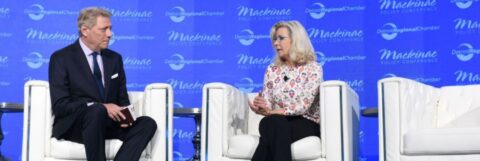- Cheney declined to commit at this time but left the door open for a potential challenge in the 2024 election.
- “Substantive” bipartisan debate is crucial to moving America forward, says Cheney.
- Her obligation to the Constitution and the rule of law, she said, is what she holds paramount and what drives all of her actions.
Liz Cheney Calls for More Bipartisan ‘Substantive’ Debate, Wouldn’t ‘Rule Out’ Presidential Bid
June 1, 2023
Key Takeaways
In an electrifying conversation with WDIV-TV anchor Devin Scillian at the Mackinac Policy Conference, former U.S. Representative Liz Cheney reiterated her dedication to the rule of law and her outspoken opposition to the party of Trump, despite what it has cost her politically. In discussing her lack of regret, she said, “After it became clear that Donald Trump was willing to go to war with the rule of law there was no moment where there was another possible honorable choice. When I look back at each step of the way, I did what my duty compelled me to do.”
Discussing Donald Trump’s Republican party and the fallout after Jan. 6, 2021, Cheney insisted that “allegiance to the Constitution is the most important thing” in American political life, less so than to a political party. “You have to defend it even — and I would say especially — when it hurts you politically.”
Cheney did engage in speculation with Scillian when asked if now might be the time for a third political party. “We are now headed to an election that nobody wants,” said Scillian, referring to the presumed Biden-Trump 2024 standoff. “I think that this is a moment where the tectonic plates of our politics are shifting,” said Cheney, “because the peril is so real.”
When Scillian asked directly whether she would consider running for President in 2024 as a third-party candidate, she replied, “I think that we have to have good people, and I don’t know yet what that is going to look like…We have across the board good candidates. We’ll see what happens but I’m not going to rule it out.”
Scillian and Cheney also discussed the role of the media in mediating truth in politics, the role of the Supreme Court, and the need for candid bipartisan conversations. “We need to listen to people — especially people who are that engaged and smart — on the other side of an issue and we need to learn from them,” Cheney said.
She also spoke with some caution about the role of AI, which she said, “could be a tremendously powerful and revolutionary important tool, but it is a very grave danger if we don’t treat it appropriately.”
Concluding with a brief conversation on foreign policy, Cheney noted that the Congressional China committee was one bright example of bipartisan cooperation. Still, she said, while the U.S. had hoped that economic cooperation and trade with China would lead to political amity, China poses a political and cultural threat. “For 20 years,” she said, “China has viewed itself as at war with the United States, and we missed it.”
